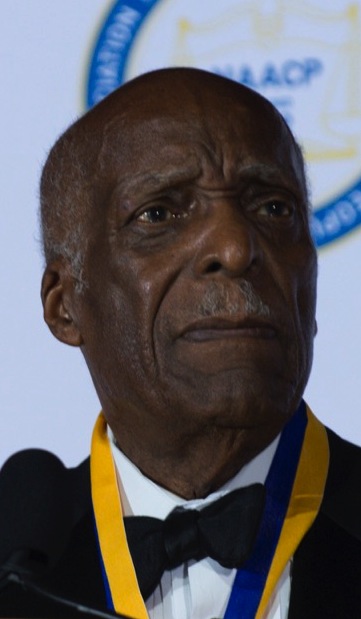Focused on equal opportunity under law
By Dan Yount, The Cincinnati Herald
Equal opportunity under the law. It was the focus of Federal Judge and Civil Rights leader Nathaniel R. Jones’ life for decades, and he has made more of a difference than most people. Judge Jones died of congestive heart failure January 26 at his home in East Walnut Hills, according to his daughter Stephanie Jones, Esq. He was 93.
Jones was born in Youngstown in 1926, 17 years after the founding of the NAACP and the publication of The Call, a document “imploring Americans to discuss and protest the racial problem and to renew the struggle for civil and political rights.” That document deeply influenced him, as did his mentor, J. Maynard Dickerson, according to his autobiography, Answering the Call.

Judge Nathaniel Jones is shown in this cover photograph on his autobiography Answering the Call that was taken in his hometown of Youngstown about a month after he had served as deputy general counsel on the Kerner Commission. Provided.
After growing up in an integrated neighborhood, Jones writes he learned a hard lesson in “deeply entrenched and pervasive” segregation when he joined the Army in 1945. Attending college on the GI Bill, he enrolled in a pre-law course, continued with law school at night, and became involved in Civil Rights issues, increasingly conscious of the ways that racism was built into voting, housing, health benefits, jobs, and education.
A graduate of his hometown school, Youngstown State University, Jones chose a legal career to help eliminate racial injustice — the kind that led to his being refused a shave in the old Sheraton Gibson barbershop during an early visit to Cincinnati. He earned his law degree from Youngstown State University. In 2003, the federal courthouse in Youngstown was named after Judge Jones.
A year after entering private practice, Jones became the first African American in Ohio to be an Assistant U.S. Attorney, when he was appointed to the Northern District of Ohio at Cleveland, a position he held until 1967.
He then was asked by his friend Merle McCurdy to serve as assistant general counsel to President Johnson’s National Advisory Commission on Civil Disorders, also known as the Kerner Commission, which made a study of the causes of the urban riots of the 1960s. McCurdy was the commission’s general counsel.
Jones said the commission’s February 1968 report known as the Kerner Report, concluded that the nation was “moving toward two societies, one Black, one White—separate and unequal.” Unless conditions were remedied, the commission warned, the country faced a “system of apartheid” in its major cities.
Jones succeeded Thurgood Marshall as general counsel for the NAACP in the 1970s. His work for the NAACP focused on desegregation, notably in the North, where judges were not convinced that the Brown v. Board of Education decision applied, and on landmark affirmative action cases.

Dinner with South African President Nelson Mandela. In a once-in-a-lifetime experience, Cincinnati federal Judge Nathaniel Jones and his late wife Lillian were asked to dine with South African President Nelson Mandela during Jones’ second visit to the country when he assisted in the drafting of a new constitution for South Africa. Photo provided
From 1969 to 1978, Jones’ work for the NAACP took him to the Supreme Court multiple times, where he argued for affirmative action in the public and private sectors, challenged efforts to maintain segregated schools in jurisdictions across the United States, and successfully defended the NAACP against attempts by Mississippi businesses and officials to bankrupt the organization through civil lawsuits brought by the targets of mass boycotts and protests in that state.
Jones also fought to overturn racial discrimination against Black people across Africa in the 1990s, working with South African President Nelson Mandela and others to write a new constitution for South Africa following the apartheid era.
“Nathaniel Jones is a pioneer who has never failed to stand for the rights of people denied a chance to be a part of the process,” said Roslyn A. Brock, chairman of the NAACP National Board of Directors. “His distinguished career serves as inspiration to our thousands of youth leaders working to end the profound segregation that continues to exist in our society to this day.

Judge Nathaniel R. Jones. Photos by Pete Coleman/The Cincinnati Herald
Judge Jones was appointed by President Carter to the U.S. Court of Appeals for the Sixth Circuit in Cincinnati in 1979. Judge Jones retired from the Sixth Circuit Court in 2002, and continued to practice law, serving as senior counsel at the firm of Blank Rome LLP until 2018.
“I see enough here to make Cincinnati an exciting place,” said Jones. “People should be proud and press on to make this city an even better place to live.”
During the 101st National NAACP Convention in 2016 in Cincinnati, Judge Jones said in receiving the NAACP’s highest honor, the Spingarn Medal, “Democracy requires participation. If you don’t participate, you don’t have anybody to blame but yourself. To be a player, you have to be involved. I recognize both the blessing of 90 years and the finite character of what is left of my life, but as long as I have breath, my advice will be to stay focused and resist efforts on the real threat, which is the nullification of the remedies that give meaning to laws against discrimination.
“I want to issue a plea to all who still believe in the NAACP’s call, some 107 years after our founding in 1909. The original Call concluded: “Hence we call upon all the believers in democracy to join in a national conference for the discussion of present evils, the voicing of protests, and the renewal of the struggle for civil and political liberty.
“This is why I am truly honored to be part of the continuing legacy of Spingarn Medalists.’’
Mayor John Cranley, on the passing of Judge Nathaniel Jones, said, in a statement, “Nathaniel Jones was one of the greatest Civil Rights leaders this nation has ever known, having worked with Thurgood Marshall during the Brown v Board case, desegregating countless schools and institutions as head of the NAACP Legal Defense Fund, to helping South Africa come out of apartheid, to ensuring individual rights as a federal judge. To be in his presence was to be in the presence of greatness. Knowing him has been one of the greatest honors of my life.
“In 2001, he helped me write my first major piece of legislation, the city’s racial profiling ban—that’s the equivalent of getting hitting lessons from Hank Aaron. Among Salmon Chase, Harriet Beecher Stowe, William Howard Taft and Fred Shuttlesworth, Nathaniel Jones was one of the five greatest Cincinnatians to have ever lived among us.”
Former Ohio State Senator Eric H. Kearney remembers being in his early 20s and meeting Judge Jones at the home of family friend, Civil Rights activist Virginia Coffey. Kearney said, “To our community, Nathaniel Jones was a judge, lawyer, educator, and determined defender of social justice. To his family, he was a dedicated father and grandfather. To me, Judge Jones was a mentor, law school professor, and inspiration. Our region, our nation and our world are a better place thanks to his contributions. Judge Jones will be dearly missed.”
In a statement, a representative of the family of the late State Representative William Mallory, said, “Judge Nathaniel R. Jones was a great legal scholar and a confidant to our beloved William L. Mallory Sr. He called Judge Jones to ask if he had a chance to file a lawsuit to change the way judges are elected in Hamilton County. The historic lawsuit was successful and Judge Jones is a big part of that success. He gave an inspiring commencement speech at the law school graduation of Judge Dwane Mallory. He was a humble man who carried himself with great honor and distinction. He fought for democracy here in Cincinnati and all over the world. He had a unique relationship with the Mallory family, and we will miss him. We send our prayers and condolences to the family of Judge Nathaniel R. Jones.’’
Although thrilled at Barack Obama’s “amazing election,” in the discourse surrounding it, Jones writes in Answering the Call, he was reminded of the need to keep Civil Rights history alive for the media, Congress and the judiciary.
Jones praises Civil Rights lawyers for tirelessly establishing legal standards and fighting federal efforts to thwart them. He mentored and inspired many young people by teaching classes at the University of Cincinnati Law School and Harvard Law School. Judge Jones was actively involved in the Summer Work Experience in Law (SWEL) program in Cincinnati.
He felt that the legal community in Cincinnati was too segregated, so with his friend, the late Judge Robert Black, he established the CBA-BLAC (Cincinnati Bar Association-Black Lawyers Association of Cincinnati) Roundtable to foster better relationships with attorneys of different races and ethnic backgrounds.
Among his numerous honors and awards, Judge Jones was named a Great Living Cincinnatian in 1997. He changed the course of history, and we are grateful.

 #NNPA BlackPress4 weeks ago
#NNPA BlackPress4 weeks ago
 #NNPA BlackPress4 weeks ago
#NNPA BlackPress4 weeks ago
 #NNPA BlackPress4 weeks ago
#NNPA BlackPress4 weeks ago
 #NNPA BlackPress4 weeks ago
#NNPA BlackPress4 weeks ago
 #NNPA BlackPress4 weeks ago
#NNPA BlackPress4 weeks ago
 #NNPA BlackPress3 weeks ago
#NNPA BlackPress3 weeks ago
 #NNPA BlackPress4 weeks ago
#NNPA BlackPress4 weeks ago
 #NNPA BlackPress3 weeks ago
#NNPA BlackPress3 weeks ago































































